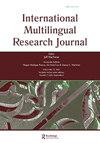Attitude towards language use and maintenance among Yorùbá-English bilinguals in the United States
IF 2.1
1区 文学
Q2 EDUCATION & EDUCATIONAL RESEARCH
引用次数: 0
Abstract
ABSTRACTThis study examines attitudes to language use and maintenance among Yorùbá-English bilinguals in the United States. Using the direct approach in language attitude research, it specifically interrogates attitudes toward using the heritage language (HL) in public domains and maintenance among subsequent generations. It also jointly examines the effect of age and length of stay in the United States on attitudes. Data is sourced via survey and semi-structured interviews from one hundred and twenty-four Yorùbá-English bilinguals residing in New York, Maryland and Texas. Results indicate a positive attitude toward HL use and maintenance among older immigrants (in spite of perceived negative attitudes) compared to the younger ones. Also, findings on attitude toward language maintenance vary depending on the immigrant’s age. Further inferential analysis reveals that age and length of stay are not significant on attitude items collectively but are significant on selected attitude elements.KEYWORDS: Language attitudeheritage languageYoruba-English bilingualsNigerian immigrantsmigrationlanguage maintenance Disclosure statementNo potential conflict of interest was reported by the author(s).Notes1 Gbeborun in Yorùbá parlance means to gossip.2 Borrow pose in Nigerian English parlance means showing off with something that is not yours.Yorùbá-English美国双语者对语言使用与维护的态度
摘要本研究考察了Yorùbá-English美国双语者对语言使用和维护的态度。运用语言态度研究的直接方法,具体考察了在公共领域使用传统语言的态度以及后代对传统语言的维护态度。它还联合调查了年龄和在美停留时间对态度的影响。数据来源于来自124位居住在纽约、马里兰和德克萨斯的双语人士Yorùbá-English的调查和半结构化访谈。结果显示,与年轻移民相比,年长移民对HL的使用和维护持积极态度(尽管他们的态度是消极的)。此外,对语言维护态度的调查结果也因移民的年龄而异。进一步的推断分析表明,年龄和停留时间对态度项目整体不显著,但对选择的态度要素显著。关键词:语言态度;传统语言;约鲁巴-英语双语;尼日利亚移民;注1:在Yorùbá的说法中,Gbeborun的意思是八卦借用姿势在尼日利亚英语中的意思是拿着不属于你的东西炫耀。
本文章由计算机程序翻译,如有差异,请以英文原文为准。
求助全文
约1分钟内获得全文
求助全文
来源期刊
CiteScore
4.10
自引率
4.80%
发文量
19
期刊介绍:
The International Multilingual Research Journal (IMRJ) invites scholarly contributions with strong interdisciplinary perspectives to understand and promote bi/multilingualism, bi/multi-literacy, and linguistic democracy. The journal’s focus is on these topics as related to languages other than English as well as dialectal variations of English. It has three thematic emphases: the intersection of language and culture, the dialectics of the local and global, and comparative models within and across contexts. IMRJ is committed to promoting equity, access, and social justice in education, and to offering accessible research and policy analyses to better inform scholars, educators, students, and policy makers. IMRJ is particularly interested in scholarship grounded in interdisciplinary frameworks that offer insights from linguistics, applied linguistics, education, globalization and immigration studies, cultural psychology, linguistic and psychological anthropology, sociolinguistics, literacy studies, post-colonial studies, critical race theory, and critical theory and pedagogy. It seeks theoretical and empirical scholarship with implications for research, policy, and practice. Submissions of research articles based on quantitative, qualitative, and mixed methods are encouraged. The journal includes book reviews and two occasional sections: Perspectives and Research Notes. Perspectives allows for informed debate and exchanges on current issues and hot topics related to bi/multilingualism, bi/multi-literacy, and linguistic democracy from research, practice, and policy perspectives. Research Notes are shorter submissions that provide updates on major research projects and trends in the field.

 求助内容:
求助内容: 应助结果提醒方式:
应助结果提醒方式:


